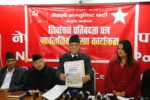KATHMANDU: In a heartbreaking narrative, Nepali women seeking employment abroad share tales of exploitation and abuse, shedding light on the dark side of foreign labor.
Binita (name changed), a 30-year-old woman from Morang, embarked on a journey to Kuwait through India in pursuit of employment opportunities.
However, due to deceptive agents, she found herself in Iraq instead. Intent on supporting her family economically, Binita, as the eldest daughter, felt the responsibility to care for her siblings, facilitate their education, and assist her elderly parents. To finance her overseas venture, she took a loan of Rs 100,000.
Regrettably, Binita’s aspirations were marred by a harrowing experience in Iraq, where she was hired as a household worker and became a victim of sexual abuse at the hands of her employer.
Five months pregnant and facing a situation beyond her control, she made the painful decision to return to Nepal.
Speaking about her ordeal, Binita expressed, “It was not my choice to go abroad. I ended up in Iraq and returned with a heavy heart.”
Her dreams shattered, Binita, now residing in a rescue center in Kathmandu, is grappling with the trauma of the abuse she suffered. Fearful of societal judgment, she has refrained from returning home.
Opting for illegal migration to Kuwait in search of improved opportunities, Sangita found herself in a household job, where she became pregnant. Witnessing the distressing experiences of other girls in similar situations, she decided to return to Nepal.
Highlighting the circumstances in Iraq, Binita revealed that she was prohibited from leaving her workplace, making it difficult for her to seek help.
“I had gone abroad with many dreams but got shattered,” she lamented, tears welling in her eyes. Unfortunately, Binita only discovered her pregnancy when it was too late for an abortion.
Complicating matters, the house owner insisted she return to Nepal for the abortion, as the procedure was against the law in Iraq.
However, upon her return, Binita learned that aborting a five-month pregnancy is also illegal in Nepal. Now, she finds herself with no choice but to proceed with the birth of her child, facing an uncertain future.
Prem Kumari (not a real name), a 32-year-old woman from Panchthar, embarked on a journey abroad in search of employment opportunities two years ago.
Choosing Jordan as her destination, she left her young child behind, only to face a traumatic incident. Working in the same garment factory as a Pakistani national, she became a victim of rape.
Recalling the horrifying experience, Prem Kumari shared, “I was kidnapped while returning from my work. I was drugged and found myself in a corner of the road when my consciousness returned. I had never imagined such behavior from a co-worker.”
Upon discovering her pregnancy, the company decided to repatriate her to Nepal. Currently six months pregnant, Prem Kumari faces the added challenge of not being accepted back into her family by her husband.
These stories underscore the urgent need for attention and solutions to address the vulnerabilities faced by Nepali women seeking employment opportunities abroad.
Married at a young age, she is confronted with the dilemma of neither wanting to undergo abortion nor be separated from her two children. Her situation reflects the harsh realities that some individuals face while seeking employment opportunities abroad.
Sangita (not a real name), hailing from Itahari, faced a similar plight when she returned to Nepal four years ago while pregnant.
Opting for illegal migration to Kuwait in search of improved opportunities, Sangita found herself in a household job, where she became pregnant. Witnessing the distressing experiences of other girls in similar situations, she decided to return to Nepal.
Currently residing in a Kathmandu rescue center, Sangita, like her counterparts, was not accepted back by her family.
She is now a mother to a three-year-old child ready for school, but her child lacks a birth certificate.
Despite her initial confidence upon returning from Kuwait, Sangita found herself grappling with challenges, particularly in obtaining birth certificates and citizenship for her child under her name.
Expressing her concerns, Sangita highlighted the ongoing difficulty in securing proper documentation, stating, “Even these days, it is challenging to get birth certificates and citizenship under the name of the mother.”
The fear of her son facing citizenship issues as he grows up has led Sangita to contemplate suicidal thoughts.
Acknowledging the challenges faced by Nepali women in Gulf countries, Ghimire admits, “Nepali women are suffering from various abuses in Gulf countries. That is the reason why the government does not grant labor permits for those countries.”
Sangita’s story is just one among many representative cases of women who suffer from sexual abuse in foreign lands. Annually, numerous women return to Nepal pregnant, with studies revealing that a significant number of them experience sexual abuse at the hands of their employers.
These stories underscore the urgent need for attention and solutions to address the vulnerabilities faced by Nepali women seeking employment opportunities abroad.
Approximately 25 to 30 women annually experience distressing situations in foreign lands and subsequently return to Nepal seeking support after being sexually abused and impregnated, according to Manju Gurung, a strategic consultant at Pourakhi Nepal, an organization committed to assisting women returning to Nepal under such circumstances.
Manju Gurung recently assisted two women who had become pregnant abroad in preparing the necessary documents for their return to Nepal.
She highlighted the discriminatory nature of labor policies, stating, “The labor policy is discriminatory, so it poses a daunting challenge for these women.” She attributed these cases to the restrictive policies that confine Nepali women to household jobs in foreign countries.
Expressing the limitations imposed by the current government policies, Manju Gurung emphasized, “Our government can neither grant permission to our women to work in household jobs abroad nor provide them with better opportunities here.
Women are compelled to go abroad and work in the household sector without labor permits, leading to these incidents.”
This discrepancy between the number of countries where permits are issued and those with signed agreements raises questions about the effectiveness of existing measures in safeguarding the rights and well-being of Nepali women working abroad.
Paurakhi Nepal receives approximately 400 women seeking justice and support, as per Manju Gurung. She stressed that this figure represents only those choosing to advocate for justice and rights, suggesting that the actual number of affected women could be significantly higher.
Manju emphasized the urgent need to amend labor permits and policies for women, calling for comprehensive changes to address the challenges faced by Nepali women seeking employment opportunities abroad.
In contrast to the accounts from organizations and consultants, Dandu Raj Ghimire, Spokesperson for the Ministry of Labor, Employment and Social Security, asserts that there have been no reported cases of such incidents.
He suggests a potential reason for the lack of reported cases, stating, “Most of the women go abroad where the government does not provide labor permission; that could be a reason.”
Acknowledging the challenges faced by Nepali women in Gulf countries, Ghimire admits, “Nepali women are suffering from various abuses in Gulf countries. That is the reason why the government does not grant labor permits for those countries.”
While the government issues labor permits for up to 110 countries, only 12 countries have signed a labor agreement so far, according to Ghimire.
This discrepancy between the number of countries where permits are issued and those with signed agreements raises questions about the effectiveness of existing measures in safeguarding the rights and well-being of Nepali women working abroad.
Further exploration and proactive measures may be needed to address the complexities surrounding the protection of women in foreign employment.









Comment